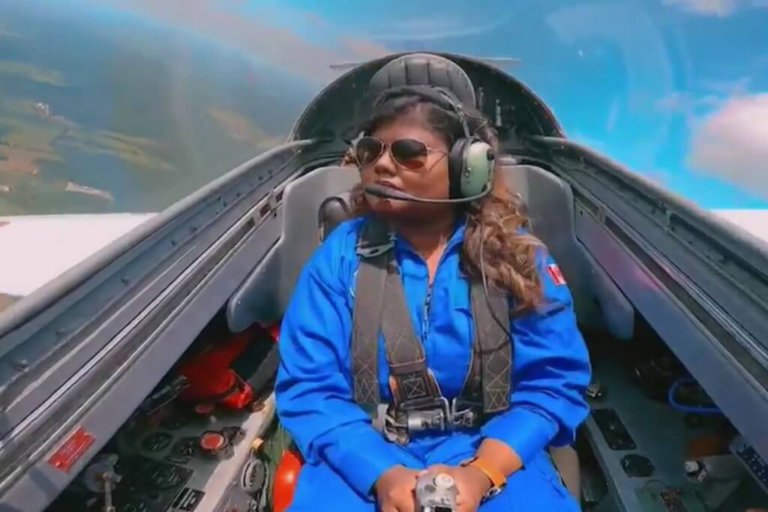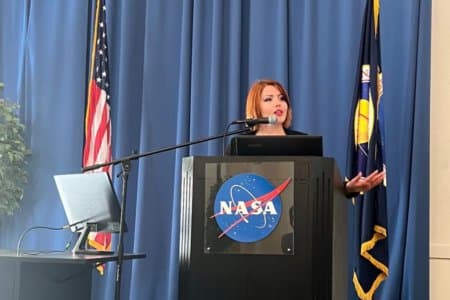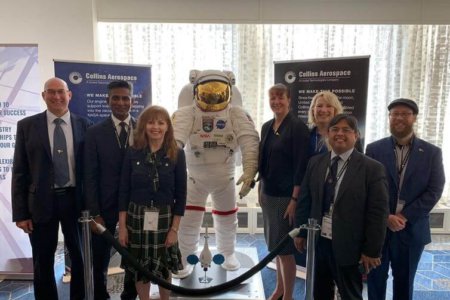
To date, there are only three Indian women who have flown into space: Sirisha Bandla, Kalpana Chawla and Sunita Williams.
Soon, Aathira Preetha Rani, an Algonquin College graduate, is hoping to add herself to this list.
The 24-year-old Indian native shared on LinkedIn that she has been selected by the International Institute of Astronautical Sciences to pursue astronautics (also known as astronomical engineering) as part of Project PoSSUM, a programme that trains citizen-scientist astronauts.
“There are also other training going on around the world. For example, in Poland, I do have a simulation mission where you live like you’re living in the International Space Station, i.e. analogue missions,” she shares with Study International.
“I have centrifugal training (which simulates a high G-force environment) with the Polish Air Force. I’m also waitlisted to fly to the edge of space.”
What’s more, she recently experienced riding a fighter jet. In her words, she is “living her dream.”
To get here, however, Rani had her fill of rough landings.

Rani’s love for all things aviation started when she received a toy aircraft from her father. Soon, it blossomed into an interest in rockets and fighter jets. Source: Athira Preetha Rani
Early life in Trivandrum
Growing up, young Rani‘s passion for all things aviation started when she received a toy aircraft from her father.
“It grew from aeroplanes to space and rockets. I wanted to be a fighter pilot,” she says.
That didn’t land well with her peers at her all-girls convent school. She couldn’t connect with them. It was the same case when she moved to a school with boys.
Worse still, one teacher chastised her passion.
“I was studying in the computer science stream. There was this boy who was very interested in space; he wrote a programme for a game related to space and I also wrote a similar programme,” she shares, recalling how the teacher praised his work.
“When it came to me, she literally tore my paper into two.”

“When I was growing up, it was like, be an obedient, good girl, don’t get into trouble, don’t climb trees, don’t get into trouble, don’t explore that kind of stuff.” Source: Athira Preetha Rani
Moving to Canada at 18
Upon graduation, Rani knew the traditional mode of success wasn’t her cup of tea.
“Most people want to either get into the Indian Institute of Technology (a group of prestigious central government-owned public technical universities located across India) or want to be a doctor,” she says.
“I was interested in science, specifically space. I also had learning disabilities, which were undiagnosed at that point. Going to mainstream education in India, where everything was a rat race to the top, wasn’t the way I could learn.”
She took a gap year instead. During this time, she started coding for university students and earned a side income to sustain herself.
Since the Indian Air Force had yet to induct female fighter pilots, the high school graduate decided to explore her options.
Soon, she secured a partial scholarship to pursue robotics at Algonquin College in Ottawa, Canada. Filled with enthusiasm and a desire to fulfil her dream, Rani left home at 18.

Rani graduated at the top of her class and was on the dean’s honours list. Source: Athira Preetha Rani
Life as a neurodiverse queer student
To be neurodiverse is to experience and interact with the world differently. While that relates to Rani’s learning disabilities, she views it as one of her strengths.
“I was really interested in the stuff I was doing and I could see concepts from a very different perspective,” she explains.
“My professor was super impressed with my way of doing labs that he actually took my notes to teach the upcoming classes.”
Things took a turn when the Trivandrum-born student had to switch majors from robotics to business. In doing so, she lost her scholarship to study robotics.
Still, Rani was determined to realise her dreams.
While studying, she worked multiple jobs, including serving as a support worker for disabled students in residence halls at night.
“I was able to save up by cutting down on groceries (more power to food cupboards), clothes and anything that was not absolutely needed,” Rani wrote on her LinkedIn.
Being bisexual also presented different challenges to her life as an international student.
“I’ve had my own share of homophobia, I’ve had my own share of racism. I’ve had people ask me to go back home, I’ve had people tell me that I shouldn’t be an astronaut,” she says.

Getting on a Cessna aircraft marks the first step of her journey to securing a pilot’s license. Source: Athira Preetha Rani
Shooting for the stars
Her hard work paid off.
She saved enough for an introductory flight with a Cessna aircraft at the end of 2019. Later, Rani got her first taste of flying a jet.
In business school, she worked on her business idea, ExoGeo, which she later incorporated into a company with her husband.
The company delivers solutions for in-orbit servicing and debris management to make space easier, more efficient, and safer to navigate.
“If something as small as a drop of paint is travelling at a very high speed and come and hit on a rocket body that is in orbit or a satellite, it can explode into a million pieces and cause a chain reaction,” she shares.
ExoGeo prevents this by building space tugs (a type of spacecraft used to transfer spaceborne cargo from one orbit to another orbit) to catch space debris and transfer this debris to a graveyard orbit, where it will automatically enter the Earth’s atmosphere.
Asked how women can break into the aerospace industry, Rani advises: “Find people that will support you — men, women, anyone. Find the right support group and network. That is the best thing you can do to move forward.”










